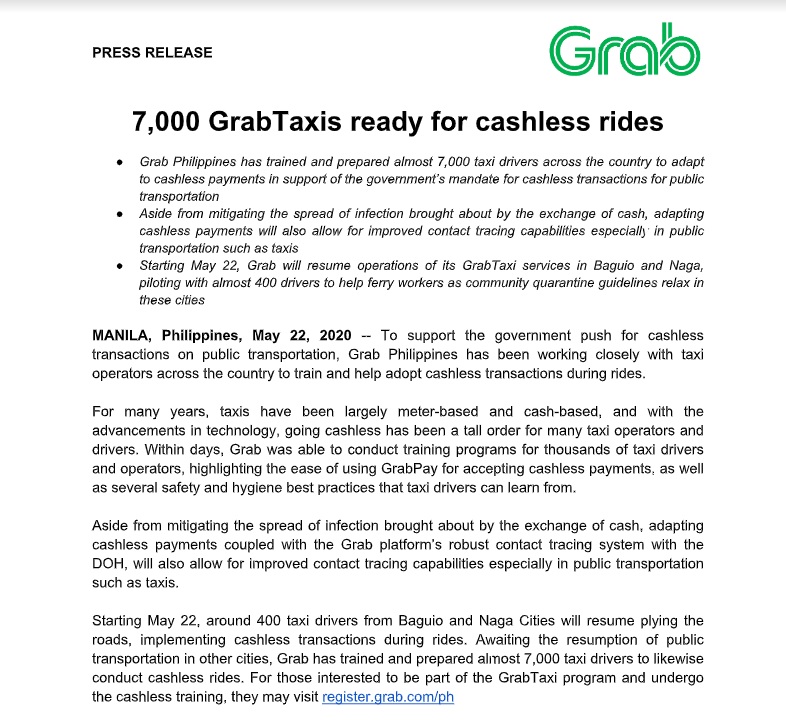Starting May 22, 2020, GrabTaxi will initially relaunch 7,000 drivers nationwide, all of which are trained for cashless payments in compliance with the government’s mandate on going cashless when it comes to public transportation.
With utmost priority for safety, Grab assures its drivers and passengers that safety and hygiene best practices will be implemented for everyone to follow, and the transition to cashless is one of the ways to practice social distancing. Tracking all transactions will also aid in contact tracing capabilities.
Grab is one with the Filipinos in the transition to the new reality, by protecting the community and its driver-partners in this initiative.

7,000 Grab Taxi is ready for cashless rides
- Grab Philippines has trained and prepared almost 7,000 taxi drivers across the country to adapt to cashless payments in support of the government’s mandate for cashless transactions for public transportation
- Aside from mitigating the spread of infection brought about by the exchange of cash, adapting cashless payments will also allow for improved contact tracing capabilities especially in public transportation such as taxis
- Starting May 22, Grab will resume operations of its GrabTaxi services in Baguio and Naga, piloting with almost 400 drivers to help ferry workers as community quarantine guidelines relax in these cities
MANILA, Philippines, May 22, 2020 — To support the government push for cashless transactions on public transportation, Grab Philippines has been working closely with taxi operators across the country to train and help adopt cashless transactions during rides.
For many years, taxis have been largely meter-based and cash-based, and with the advancements in technology, going cashless has been a tall order for many taxi operators and drivers. Within days, Grab was able to conduct training programs for thousands of taxi drivers and operators, highlighting the ease of using GrabPay for accepting cashless payments, as well as several safety and hygiene best practices that taxi drivers can learn from.
Aside from mitigating the spread of infection brought about by the exchange of cash, adapting cashless payments coupled with the Grab platform’s robust contact tracing system with the DOH, will also allow for improved contact tracing capabilities especially in public transportation such as taxis.
Starting May 22, around 400 taxi drivers from Baguio and Naga Cities will resume plying the roads, implementing cashless transactions during rides. Awaiting the resumption of public transportation in other cities, Grab has trained and prepared almost 7,000 taxi drivers to likewise conduct cashless rides. For those interested to be part of the GrabTaxi program and undergo the cashless training, they may visit register.grab.com/ph
“As we move towards the new reality, we would need to make significant adjustments in many aspects of our lives so that we can protect both the lives and livelihoods of our kababayans. Over a short period of time, we were able to help our taxi drivers – who are previously cash-based and meter-based, embrace digitalization, and adapt to cashless. We believe that by adopting cashless payment for public transportation, we will reduce the risk of spreading the infection through cash, but likewise improve our contact tracing capability,’ says Grab Philippines President Brian Cu.
More from News
Digital Walker Launches Cosmic Box: A Tech-Powered Mystery Unboxing Experience This February!
Tech shopping just got a whole lot more exciting. This February, Digital Walker is launching Cosmic Box, an exclusive blind …
Salmon Launches New Affiliate Program! Get Up to PHP 500 for Every Successful Referral
Salmon Launches Affiliate Program to Empower Filipino Creators and Expand Financial Access Salmon, a leading fintech company in the Philippines, has …





